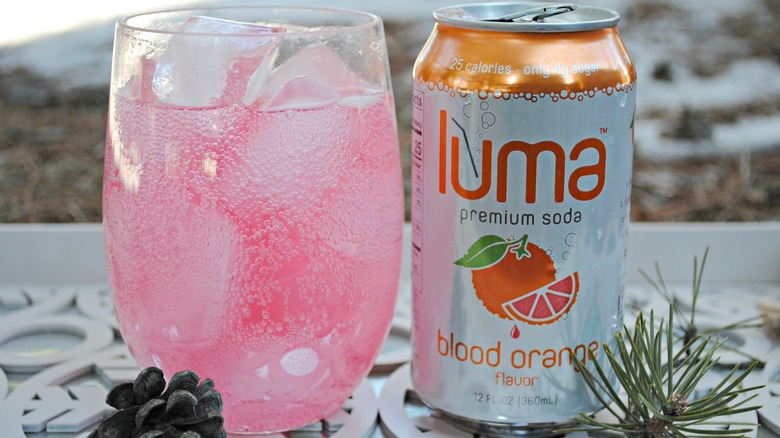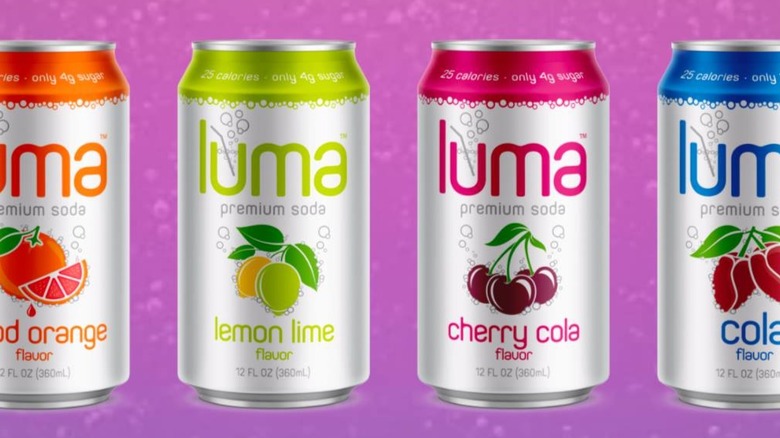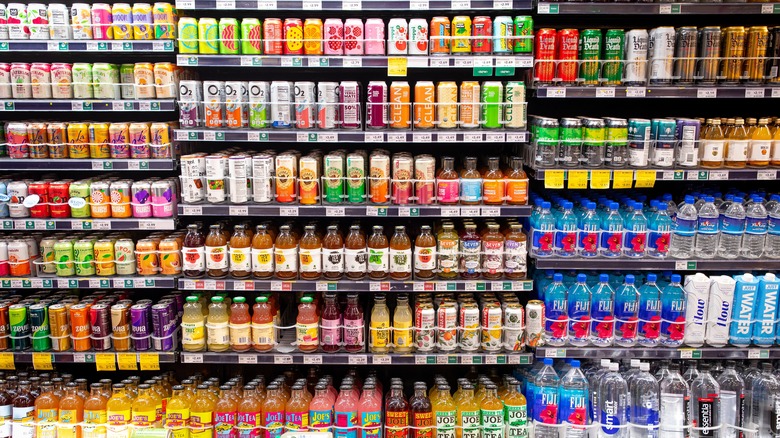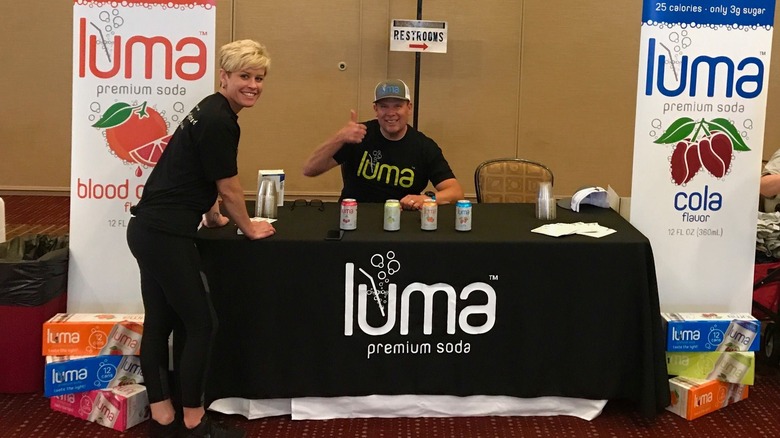Whatever Happened To Luma Soda From Shark Tank?
First off, the beverage industry seems like an extremely difficult sector to break into. Some entrepreneurs have been successful, but you really have to bring your A-game or have a very good product that strikes while the iron is hot. Luma Soda was introduced as a healthier alternative to traditional sodas. The company's goal was to provide a low-calorie beverage without artificial sweeteners.
Its founder, Jim Otteson, a former trial attorney, sought to cater to health-conscious consumers who were looking for a natural soda option. The product was sweetened with a combination of honey and monk fruit, resulting in 25 calories and four grams of sugar per can. Flavors included cola, cherry cola, blood orange, and lemon-lime.
Otteson invested approximately $1.75 million of his own money into developing and marketing Luma Soda, and he was hopeful he had a product that could disrupt the beverage industry's biggest names with his innovative approach. The company primarily sold its products online, with aspirations to expand into retail stores. Even with the initial enthusiasm, Luma Soda faced significant challenges in gaining market traction.
In 2019, Otteson appeared on Season 10, Episode 19 of "Shark Tank," seeking a $500,000 investment for 20% equity in his company. The episode provided national exposure and an opportunity to secure strategic partnerships. However, the outcome of the pitch wasn't favorable. Luma Soda didn't get a Shark in its corner, and things ultimately didn't pan out the way Otteson was hoping.
What happened to Luma Soda on Shark Tank?
During his appearance on "Shark Tank," Jim Otteson presented Luma Soda as a healthier type of soda which contained natural sweeteners and a low-calorie content. He highlighted his personal journey, transitioning from a heavy diet soda consumer to the creator of his own beverage company to address health concerns. Otteson offered samples of the four available flavors to the Sharks, receiving mixed reviews.
In typical Shark fashion, the financials came up and they wasted no time digging into the details of how he had made a profit so far. At the time, Luma Soda had generated approximately $180,000 in sales, with a repeat customer rate of only 10%. Yikes. As mentioned, Otteson disclosed he had invested $1.75 million of his own funds into the business, including $600,000 in inventory and $30,000 in cash reserves.
The high price point of $19.99 for a 12-pack was another point of contention. Your soda had better contain heaven itself if you're going to try to get consumers to pay 20 bucks for 12 cans of pop so long as you're not at an amusement park or movie theater (where you expect things to be ridiculously overpriced).
Barbara Corcoran was very hesitant, but she expressed interest and offered $250,000, contingent on partnering with guest Shark Rohan Oza. However, Oza declined, citing concerns about the company's valuation and scalability. Without Oza's involvement, Corcoran withdrew her offer. They both thought Otteson was a really nice guy, but his charm wasn't enough to push him over the hump. Ultimately, none of the Sharks invested in Luma Soda, and Otteson left the show without a deal.
Luma Soda after Shark Tank
Following its appearance on "Shark Tank," Luma Soda received a short-term spike in visibility and interest, particularly from health-conscious consumers curious about a craft soda made with monk fruit and honey. The brand experienced a surge in website visits immediately after the episode aired and garnered some attention on Amazon. However, that momentum quickly slowed. The company struggled to turn national exposure into lasting sales growth. While the pitch helped introduce the product to a wider audience, the cost per unit seemed to be a huge barrier, especially for customers unfamiliar with how beverages stay sweet without sugar or who are skeptical of alternative sodas.
Efforts to get into retail outlets fell short. Luma Soda continued selling primarily through its website (which has now shut down) and Amazon, but it never secured significant shelf space in grocery stores or health food chains. Its Facebook page became inactive shortly after the Shark Tank episode aired, with the final post dating back to September 2018. Engagement on other platforms, like Instagram and Twitter, also dwindled. In January 2019, founder Jim Otteson's LinkedIn profile showed he was no longer serving as CEO, signaling a leadership shift or loss of momentum.
Eventually, the company's website went offline and product listings on Amazon were marked as "currently unavailable." No new flavors were launched, no marketing campaigns followed, and customer communication disappeared. Without retail partnerships, investor backing, or a strong repeat customer base, the business simply couldn't survive. Offering a different kind of product in a competitive category just didn't convert.
Why did Luma Soda go out of business?
Luma Soda may have officially gone out of business in 2021 after a prolonged period of low visibility and diminished customer engagement. The company's initial promise — a natural soda without artificial sweeteners — was somewhat intriguing, possibly because of FOMO, but that was short-lived. It couldn't overcome the financial and operational realities of the beverage industry. Founder Jim Otteson had invested a bunch of his own money into the venture, but that self-funding model wasn't sustainable without further outside capital. And without a deal on "Shark Tank," Luma Soda lacked the strategic partnerships many startups rely on to grow.
The biggest challenges seem to have come down to cost and visibility. Producing small-batch sodas using specialty sweeteners like honey and monk fruit proved expensive, which forced the company to charge more per can than many consumers were willing to pay. A 12-pack priced at nearly $20 deterred price-conscious buyers, especially when competing brands like Zevia offered more affordable alternatives. Distribution was another obstacle — Luma Soda relied too heavily on e-commerce and never broke into major grocery chains, convenience stores, or cafes.
Even more concerning was the product's low repeat purchase rate, reported to be around 10% at the time of the pitch. This suggested that while people may have been willing to try Luma Soda once, few were inclined to buy it again. Combined with limited marketing, no influencer partnerships, and a fading online presence, the brand slowly disappeared from the market.
What's next for Luma Soda's founder?
After Luma Soda shut down, founder Jim Otteson returned to his legal roots. He established his own practice — Otteson Law — where he focused on litigation involving consumer protection, fraud, and intellectual property. Though he stepped away from his law firm in 2021, the firm's website remains active, suggesting a potential for ongoing or future involvement.
In 2021, Otteson took on a new leadership role as managing director of the Partner Practice Group at Major, Lindsey, & Africa, a prominent legal search and consulting firm. There, he leverages both his legal expertise and entrepreneurial experience to help legal professionals navigate career changes and firm transitions. While Luma Soda didn't reach its long-term goals, Otteson's pivot back to law shows resilience and an ability to adapt following a tough career setback.
As for Luma Soda itself, consumer reactions were mixed. Many appreciated the use of natural sweeteners like honey and monk fruit instead of artificial alternatives. Some Amazon reviewers praised the clean taste and noted it avoided sugar alcohols, which can cause digestive discomfort. Others, however, were less impressed. Negative reviews cited a lack of flavor or compared it unfavorably to other healthy soda options like Bai Bubbles. One blunt reviewer simply stated, "The soda is gross. Drink water."
That said, a blog post from Morningside Fit offered a more balanced take, noting the blood orange flavor was enjoyable and highlighting the brand's lower calorie count as a plus for health-conscious consumers. In the end, Luma Soda's niche appeal and inconsistent reception may have limited its ability to thrive in the highly competitive beverage market.




